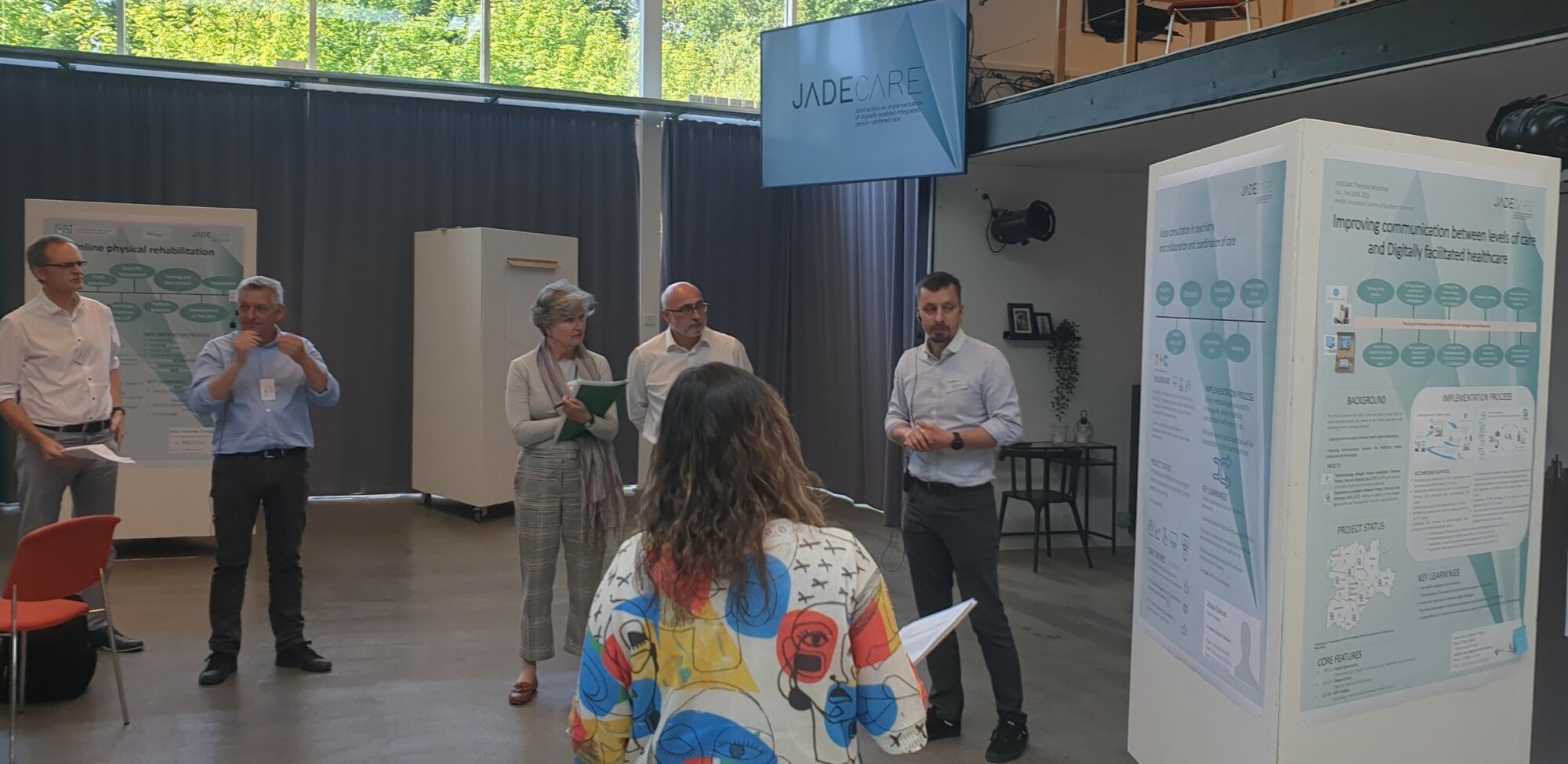Focus Article: Impressions from and Learnings Highlighted at JADECARE Implementation Key Learning Workshops
JADECARE intends to reinforce the capacity of health authorities to successfully address important aspects of health system transformation to digitally enabled, integrated, person-centred care in the EU. To achieve these goals, four project partners, i.e. leaders of original Good Practices (oGPs) are supporting Next Adopters (NAs) to transfer the successful practices into their local contexts.
In total, 21 NAs from 16 EU countries participate in JADECARE, which created a very complex and heterogeneous implementation process. The starting points of the NAs differed in various aspects, for example regarding the health care systems in which they were operating, the political frameworks, the stakeholder environment etc.
Continuous support, monitoring, exchange of implementation experiences from different settings and adaptations to the specific interventions were needed, using several different approaches. One of these methodological steps has recently been implemented by organising four JADECARE (Implementation) Key Learning Workshops. These Workshops were held in May and June 2023. They were hosted in Bilbao, Barcelona, Hamburg, and Odense by the so-called early Adopters (leaders) of original Good Practices (oGPs). The workshops marked an important milestone on the NAs path to successfully adopt their chosen good practices. Every NA had the opportunity to report and discuss the final results of the implementation of their good practice. Next Adopters attended the workshops as well as their respective oGPs, other stakeholders and project partners. In total 90 participants joined the workshops either onsite or online.
The main objectives of these workshops were:
- To share experiences and results of the implementation of the NAs, focusing on the main results and learnings, general outputs and impact, deviations, problems encountered, unexpected findings and mitigation actions implemented.
- Self-evaluation of the implementation results with recommendations for future improvement actions
- Discuss challenges and actions to ensure the sustainability of the NAs beyond JADECARE.
All workshops followed a consistent format for ensuring a meaningful comparison of the different experiences adapting the good practices and the key statements for sustainability. Based on that concept, all workshops were conducted with the same goals, topic structures and intentions of discussions, but in some few cases differing organisation and procedure.
The NAs were given the opportunity to showcase their implementation key learning results and discuss them with the other participants. Their presentations revolved around successes, deviations, problems encountered, unexpected findings and mitigation actions implemented as well as learnings and experiences. After that, there was time to present solutions on how the NAs handled challenges or barriers, to give recommendations based on experiences, to identify connecting points, similarities, and differences.

In a second part of the workshops, each NA presented the sustainability strategies and sustainability action plans they developed in the course of the JADECARE project. Together with the other participants they discussed their experiences, the challenges they faced and identified connecting points in terms of how to make their project results sustainable.
For contextualising the key learnings it has to be put in consideration that all 21 participating NAs are characterised by preconditions, like different health systems, political regulations, structures, and challenges. In addition to that, the Next Adopters have chosen different good practices or components of good practices to adapt. Thus, their key learnings are highly individual and must be seen in their specific contexts. Despite these different circumstances, some NAs who adopted the same oGP or components of the same oGP shared similar learnings.
oGP 1: Basque health strategy on ageing and chronicity: Integrated care (Basque Country, Spain)
- Involving policymakers as stakeholders from a very early stage of the design of the implementation is recommended.
- The framing of activities into current initiatives and policies was beneficial.
- The involvement of local politicians has led to the creation of a new grant programme and an eHealth working group.
- As main learnings, the co-design including involvement of patients and healthcare professionals, the identification of champions and the development of a communication and dissemination plan were highlighted, as well as accounting on end users during the implementation.
- The stakeholders needs should be taken into consideration from the beginning.
oGP 2: Catalan Center for Open Innovation on ICT-supported integrated care services for chronic patients (Catalonia, Spain)
- Customization of any transfer initiative to the site-specific characteristics is mandatory.
- Sustainable adoption of any initiative/intervention is closely dependent on demonstration of healthcare value generation.
- Cultural change needed for a successful implementation process requires local networking with high levels of engagement of all stakeholders.
- Health system transformation toward integrated care requires formulation of well-defined local strategies for: i) health risk assessment, ii) implementation of innovative services, and iii) mature digitalization of integrated care services.
- Substantial efforts should be devoted to enhance applicability of current evaluation schemes/tools into real-world scenarios aiming at facilitating:
- assessment of healthcare value-generation,
- characterization of implementation processes, and
- long-term quality assurance after adoption
oGP 3: The OptiMedis model – integrated population-based care (Germany)
- Discussions at study visits and live sessions are important, especially in pre-implementation phase.
- The complexity of the adopted strategy makes it necessary to have more time for the implementation phase.
- Arousing the interest of stakeholders in the project is of paramount importance.
- If Integrated Care is already common sense in the region, this is extremely beneficial for sustainable implementation. Therefore, it should be considered implementing integrated care first.
- Policy makers and ministries that share priorities need to synchronize; it is most beneficial to work with policy makers from local level. They should be supported by the project.
- It is important to show the need for a vision, not a solution without a problem (i.e. provide real lefe examples).
- Stable finance structures are more sustainable than fundraising.
- Concrete pieces of work manage to attract a lot of stakeholders.
oGP 4: Digital roadmap to an integrated health care sector (Southern Denmark Region)
- IT professionals are difficult to acquire but it is important to have them on board from the beginning of the project. Tapping into pre-existing IT-infrastructure can be helpful.
- It is important to be proactive with sharing the project with key stakeholders.
- It may be tempting to go big with the objectives of your project – but big changes happen through small steps.
- Readiness of the physicians to involve in development of digitalization needs to be considered. If they are not ready, then there needs to be worked on how to prepare them.
- Creating engagement through idealism and potential of improvement engages people who hope for a sustainable and better future.
- Alignment with local strategies and plans of the model is important and should be embedded into the objectives of the project. Embedding JA into an already ongoing strategy gives the project a solid starting point for sustainable implementation.
- The involvement of local politicians has led to the creation of a new grant programme and an eHealth working group.
- Relevant stakeholders for sustainability are Research networks, scientific societies, and patient associations at different levels of governance structures that are accountable for reinforcing the capacity of the healthcare system. Leading organization should emphasize a bottom-up and top-down interactions and communications with an aim of creating a “community”.
- A strong evaluation design can be used to build a strong business case. The business case can secure funding after the project period.

JADECARE Next Adopters mutually presenting and debating key learnings on oGP4 Digital roadmap to an integrated health care sector (Southern Denmark Region)
Got newsletter forwarded? Click here for subscribing for your own copy
Focus Article: Evaluation and Digital Transformation of JADECARE Integrated Care Services
Integrated Care is acknowledged as an effective and efficient (value-based) approach to cover health and social care needs of patients with chronic disorders. However, its large-scale adoption requires solving unmet needs in two main fields: evaluation of service implementation in real-world settings, and achievement of mature digital support for integration among the different complexity levels of healthcare assistance, in addition to the stakeholders involved in the process. JADECARE, the European Joint Action on implementation of digitally enabled integrated person-centred care (https://www.jadecare.eu/) has established itself as a front-runner initiative for addressing core aspects of health system transformation in the European Union.
In this framework, Erik Baltaxe, MD at Sheba Medical Center, Israel has performed five studies that will constitute a PhD Thesis (still to be defended at the University of Barcelona in September 2023). This article summarises this research work performed in the context of the Catalan original Good Practice within JADECARE.

The current research was performed in the context of the Catalan original Good Practice of the European Joint Action on implementation of digitally enabled integrated person-centred care (https://www.jadecare.eu/), an initiative launched to address core aspects of health system transformation in the European Union. The PhD thesis involves five studies (see list at bottom of article) that encompass the two main blocks of unmet needs for health system transformation, which are subject to supporting transfer processes in JADECARE.
The rationale behind the first block is that clinical medicine relies on evidence of efficacy produced by randomized clinical trials. However, proven efficacy-effectiveness gaps seen in complex interventions, such as integrated care, are limiting adoption, as well as comparability among sites. The first manuscript (BMC Health Services Research. 2019; 19:370. doi.org/10.1186/s12913-019-4174-2) hypothesized that a comprehensive, highly applicable, evaluation framework should foster adoption and transferability of integrated care services in different contexts, as shown for prehabilitation and hospital at home services in Catalonia. Moreover, the identification of key performance indicators, encompassing different service dimensions, should lead to creation of user-profiled dashboards to facilitate service monitoring after adoption. Likewise, the co-creation process conducted to shape the prehabilitation service (IJIC, 2022; 22(4): 1, 1–12. doi. org/10.5334/ijic.6503), combining design thinking techniques and quality improvement methodologies (PDSA cycles, SWOT analysis and assessment of maturity of the landscape, as applied in JADECARE) with contributions of the relevant stakeholders, showed its crucial role to efficiently shape and implement innovative care pathways, as well as to create usable and acceptable digital tools to support value-based integrated care services. The approach proposed was useful for solving maturity gaps facilitating sustainable adoption of novel services. A lesson learnt during the research lifespan was that future co-creation processes could be optimized by adopting a building-blocks strategy wherein each block addresses a specific target.
The second objective of the thesis, also supporting concrete implementations in the JADECARE framework, was to explore the pre-pandemic technological ecosystem supporting integrated care in terms of maturity and integration with the aim to generate actionable recommendations for the different stakeholders. The rationale behind the technological block was that digital transformation in healthcare is already a reality in every day clinical practice. Nonetheless its implementation has been uneven and is still immature. Therefore, the second block of the thesis addresses three core aspects: i) Performs a structured descriptive approach of the status of digital transformation in Europe (J Med Internet Res 2019;21(8):e14956. doi: 10.2196/14956); ii) Explores the potential and the limitations of mHealth in a specific use case – Home-based non-invasive ventilation (JMIR Mhealth Uhealth. 2020; 8(4): e16395. doi.org/10.2196/16395); and iii) Generates recommendations for evaluation of digital health tools (J Med Internet Res. 2023 Jan 4;25:e40976. doi: 10.2196/40976). The three studies confirmed the key role of mHealth tools to support collaborative adaptive case management and identified major pending challenges of digital transformation, namely: change management, interoperability, integration into clinical workflows, and health risk assessment for service selection. The experience acquired with the development of digital solutions supporting different integrated care services, and the analysis of existing regulatory frames, allowed the formulation of recommendations for pre- and post-marked evaluation of digital health tools.
While acknowledging that relevant challenges still need to be faced, it is concluded that the evaluation framework and the co-design strategy proposed in the thesis demonstrated to facilitate scalability and transferability of the integrated care services, whereas the second block of the thesis constitutes valuable contributions towards digital health transformation.
Full references and access to published material:
- Baltaxe E et al. Evaluation of integrated care services in Catalonia: population-based and service- based real life deployment protocols.BMC Health Services Research. 2019; 19:370. https://doi.org/10.1186/s12913-019-4174-2
- Baltaxe E et al. Digital Health Transformation of Integrated Care in Europe: Overarching Analysis of 17 Integrated Care Programs.J Med Internet Res 2019;21(8):e14956. https://doi.org/10.2196/14956
- Baltaxe E et al. Integrated Care Intervention Supported by a Mobile. Health Tool for Patients UsingNoninvasive Ventilation at Home: Randomized Controlled Trial. JMIR Mhealth Uhealth. 2020;8(4):e16395. https://www.doi.org/10.2196/16395
- Baltaxe E et al. Role of Co-creation for Large-Scale Sustainable Adoption of Digitally Supported Integrated Care: Prehabilitation as Use Case.International Journal of Integrated Care, 2022; 22(4): 1, 1–12. doi: https://doi. org/10.5334/ijic.6503
- Baltaxe E et al. The Assessment of Medical Device Software Supporting Health Care Services for Chronic Patients in a Tertiary Hospital: Overarching Study. J Med Internet Res. 2023 Jan 4;25:e40976. https://doi.org/10.2196/40976.
Matching physical activity data with health services consumption data also showed an improvement in general well-being, expressed by a reduction in health care services consumption.
Only routine data from the local health insurer and project data from the SSSO data base were used for this analysis. No primary data collection was done. A combination with patient satisfaction data was anticipated at the beginning but failed due to lack of repeated measurements. For the analysis of program effects on health care costs data from the participant database from the SSSO program were matched with data from the public health insurer (CPAM du Bas Rhin). Patient functional status was assessed at the beginning, during and at the end of the program. For health care services consumption, health insurance data from program participants were compared with matched non-participants. Matching was done on age, gender, residence, and diagnosis.
Got newsletter forwarded? Click here for subscribing for your own copy
JADECARE Newsletter Subscription:
Load content below to proceed
Click on the button to load the content from 8f23b36d.sibforms.com.
